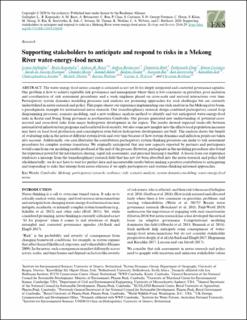| dc.contributor.author | Gallagher, Louise | |
| dc.contributor.author | Kopainsky, Birgit | |
| dc.contributor.author | Bassi, Andrea Marcello | |
| dc.contributor.author | Betancourt, Andrea | |
| dc.contributor.author | Chanmeta, Buth | |
| dc.contributor.author | Puthearath, Chan | |
| dc.contributor.author | Simon, Costanzo | |
| dc.contributor.author | Sarah St. George, Freeman | |
| dc.contributor.author | Chandet, Horm | |
| dc.contributor.author | Sandab, Khim | |
| dc.contributor.author | Malyne, Neang | |
| dc.contributor.author | Naroeun, Rin | |
| dc.contributor.author | Ken, Sereyrotha | |
| dc.contributor.author | Kimchhin, Sok | |
| dc.contributor.author | Chansopheaktra, Sovann | |
| dc.contributor.author | Michele, Thieme | |
| dc.contributor.author | Karina, Watkins | |
| dc.contributor.author | Wyborn, Carina | |
| dc.contributor.author | Bréthaut, Christian | |
| dc.date.accessioned | 2021-08-10T13:32:45Z | |
| dc.date.available | 2021-08-10T13:32:45Z | |
| dc.date.created | 2020-12-02T19:45:40Z | |
| dc.date.issued | 2020 | |
| dc.identifier.issn | 1708-3087 | |
| dc.identifier.uri | https://hdl.handle.net/11250/2767220 | |
| dc.description.abstract | The water-energy-food nexus concept is criticized as not yet fit for deeply integrated and contested governance agendas. One problem is how to achieve equitable risk governance and management where there is low consensus on priorities, poor inclusion and coordination of risk assessment procedures, and a weak emphasis placed on cross-scale and sectoral interactions over time. Participatory system dynamics modeling processes and analyses are promising approaches for such challenges but are currently underutilized in nexus research and policy. This paper shares our experience implementing one such analysis in the Mekong river basin, a paradigmatic example for international nexus research. Our transdisciplinary research design combined participatory causal loop diagramming processes, scenario modeling, and a new resilience analysis method to identify and test anticipated water-energy-food risks in Kratie and Stung Treng provinces in northeastern Cambodia. Our process generated new understanding of potential cross-sectoral and cross-level risks from major hydropower development in the region. The results showed expected trade-offs between national level infrastructure programs and local level food security, but also some new insights into the effects local population increases may have on local food production and consumption even before hydropower developments are built. The analysis shows the benefit of evaluating risks in the nexus at different system levels and over time because of how system dynamics and inflection points are taken into account. Additionally, our case illustrates the contribution participatory system-thinking processes can make to risk assessment procedures for complex systems transitions. We originally anticipated that any new capacity reported by partners and participants would come from our modeling results produced at the end of the process. However, participants in the modeling procedures also found the experience powerful the information sharing, rapid risk assessment, and personal learning it enabled. A lesson from our experience reinforces a message from the transdisciplinary research field that has not yet been absorbed into the nexus research and policy field wholeheartedly: we do not have to wait for perfect data and incontestable results before making a positive contribution to anticipating and responding to risks that emerge from nexus relations if we apply participatory and systems-thinking informed approaches. | en_US |
| dc.language.iso | eng | en_US |
| dc.publisher | The Resilience Alliance | en_US |
| dc.rights | Navngivelse-Ikkekommersiell 4.0 Internasjonal | * |
| dc.rights.uri | http://creativecommons.org/licenses/by-nc/4.0/deed.no | * |
| dc.title | Supporting stakeholders to anticipate and respond to risks in a Mekong River water-energy-food nexus | en_US |
| dc.type | Journal article | en_US |
| dc.type | Peer reviewed | en_US |
| dc.description.version | publishedVersion | en_US |
| dc.rights.holder | Copyright 2020 The Authors | en_US |
| dc.source.articlenumber | 29 | en_US |
| cristin.ispublished | true | |
| cristin.fulltext | original | |
| cristin.fulltext | original | |
| cristin.qualitycode | 1 | |
| dc.identifier.doi | 10.5751/ES-11919-250429 | |
| dc.identifier.cristin | 1855536 | |
| dc.source.journal | Ecology & society | en_US |
| dc.identifier.citation | Ecology & society. 2020, 25(4), 29 | en_US |
| dc.source.volume | 25 | en_US |
| dc.source.issue | 4 | en_US |

